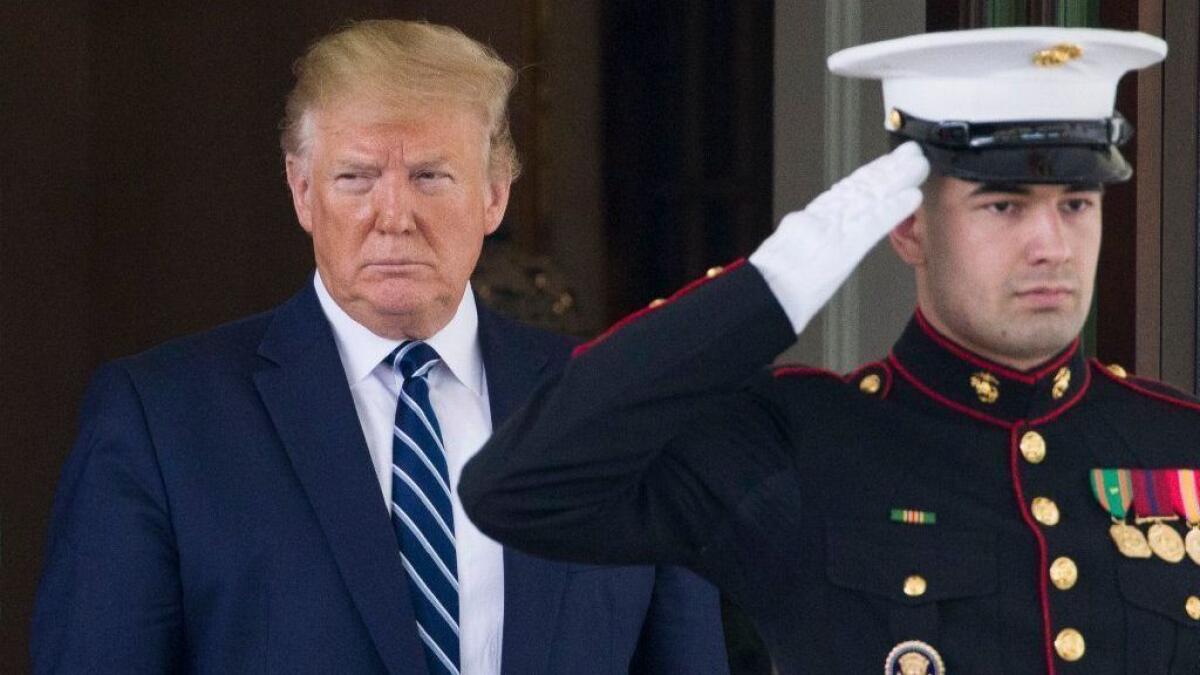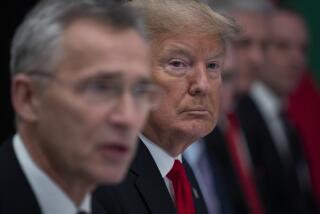Trump calls Iranian shootdown of Navy drone a ‘fly in the ointment.’ Say what?

When Donald Trump ran for the White House in 2016, he blamed previous presidents for sending U.S. troops into endless, grinding wars and vowed to stay out of foreign conflicts.
This week, he twice showed he meant it. On Monday, he dismissed explosions aboard two oil tankers that the U.S. had blamed on Iran as “very minor.” And on Thursday he shrugged off a more serious provocation, a predawn Iranian missile strike that downed a high-flying U.S. Navy surveillance drone.
While he could still order retaliation, Trump initially sounded unruffled, calling the Iranian ground-to-air missile launch an inadvertent error by a rogue unit or general, someone “loose and stupid,” rather than a dramatic attack that might require a U.S. military response.
“I find it hard to believe it was intentional,” Trump said, despite a boast by Iran’s foreign minister that Iranian forces had deliberately shot down the Global Hawk for, in his telling, violating Iranian airspace. The Pentagon denied that, insisting the drone was over international waters.
“I imagine someone made a mistake,” Trump said. Instead of saying that Iran had gone too far, he dismissed the attack as “a new wrinkle, a new fly in the ointment.”
It was the latest case of Trump giving a selectively optimistic interpretation of unsettling events and giving hostile foreign leaders the benefit of the doubt.
In each case, he has used economic tools — sanctions — but avoided armed conflict. And he has dangled the possibility of one-on-one talks with adversaries that potentially offer Trump high-profile summitry and legacy-burnishing agreements.
“He doesn’t want to get involved in a military conflict, that’s very clear,” said Ian Bremmer, president of the Eurasia Group, a global risk assessment firm. “If he wanted to wag the dog, he’s had a dozen opportunities and he’s avoided every single one.”
Last month, for example, he dismissed his administration’s assessment that two short-range ballistic missile tests by North Korea violated United Nations Security Council resolutions.
“My people think it could have been a violation,” Trump said in Tokyo at a news conference with Japanese Prime Minister Shinzo Abe. “I view it differently.”
Trump has held two nuclear summits since last June with North Korea’s dictator, Kim Jong Un, and still hopes to revive the stalled negotiations. In the meantime, Kim’s regime has continued to produce fuel for its growing arsenal of nuclear weapons.
Trump has surrounded himself with hawkish advisors, especially national security advisor John Bolton and Secretary of State Michael R. Pompeo, and especially on Iran. And he crows about how much he has done for the military, bragging about signing off on a slight increase to the Pentagon’s budget, and how much troops love him.
Yet he has refused to expand major U.S. combat operations overseas, battling his own advisors over his efforts to pull U.S. troops out of Syria and Afghanistan. He has pushed back against Pentagon requests to send thousands more troops to the Middle East to counter Iran.
James Jay Carafano, a fellow at the conservative Heritage Foundation who speaks with administration officials frequently, said Trump often uses provocative rhetoric as a negotiating tactic to gain a foreign leader’s attention.
He said Trump’s goal is to protect U.S. interests without escalating conflicts, or getting into costly occupations or nation-building operations.
The president wants to “demonstrate our willingness to protect U.S. interests but [he’s] not out to change the world,” he said. “We don’t want to conquer countries. We don’t want to do nation building. We don’t want to do regime change.”
Trump’s lack of interest in foreign intervention was clear during his administration’s half-hearted efforts this spring to oust Venezuelan leftist President Nicolas Maduro.
In January, Trump declared opposition leader Juan Guaido the nation’s legitimate president. Bolton let TV cameras see a yellow notepad on which he had scrawled “5,000 troops to Colombia,” which borders Venezuela, suggesting a military response was imminent.
Six months later, no U.S. troops have been deployed to the region. After a failed U.S.-backed coup attempt, Maduro remains in power, and Trump rarely mentions the problem.
The rising tensions with Iran can be traced to Trump’s withdrawal last May from the 2015 Iran agreement that had constrained Iran’s nuclear ambitions, and began reimposing harsh U.S. sanctions lifted under the deal.
The move satisfied the president’s political backers and Israel’s hard-line Prime Minister Benjamin Netanyahu but aggravated the five other major powers who had signed the deal. It also antagonized Iran, which continued to unwind its nuclear program under international monitoring.
Iran said this week that it would soon exceed limits on storage of low-enriched uranium, a violation of the agreement that does not put Tehran back on the path to a bomb — but reminds the world it might go there.
Michael Hayden, a former CIA director, said Trump withdrew from the nuclear deal without a replacement strategy — and without support from America’s traditional allies.
“I cannot see what the United States was doing for the last year,” Hayden said. “We’ve had this confrontation without our allies.”
In imposing new economic sanctions and ramping up his rhetoric about the menace of Iran, Trump has pointedly left the door open for possible negotiations.
That mirrors his approach with North Korea. In his first address to the U.N. General Assembly in September 2017, Trump threatened to “destroy” North Korea and its leader. He dubbed Kim “Rocket Man” on a “suicide mission.”
The tough talk and stiff economic sanctions apparently helped motivate Kim to suspend nuclear tests and long-range ballistic missile tests and to meet with Trump in Singapore last June and again in February in Hanoi. Neither led to Trump’s goal — getting Kim to give up his nuclear weapons.
Even after the second summit fell apart, Trump has expressed optimism about an eventual deal. He still praises Kim, speaks of their “love” letters and insists a third summit is possible.
Nothing suggests the president’s unconventional approach will convince Iran’s leaders to agree to face-to-face talks. The country’s supreme leader, Ali Khamenei, is fiercely antagonistic to the United States and hasn’t left the country in 30 years. Few expect him to jet off now for a tete-a-tete with Trump.
“I think it’s pretty clear [Trump is] trying to signal he does want a discussion and does want to suggest he can make things better,” said Christopher R. Hill, a former ambassador to four countries. “There’s no coherence to any of this except that somehow if he can get the Iranians to bend the knee, then he’ll be able to prove to his base he did it by being tough.”
“The trouble is the ayatollahs, who run the place, are not inclined to do that for him,” he added. “Iran has showed no interest in flattering him the way other nations have, and so he’s a little bit at sea now about what to do about it.”
More to Read
Get the L.A. Times Politics newsletter
Deeply reported insights into legislation, politics and policy from Sacramento, Washington and beyond. In your inbox three times per week.
You may occasionally receive promotional content from the Los Angeles Times.








